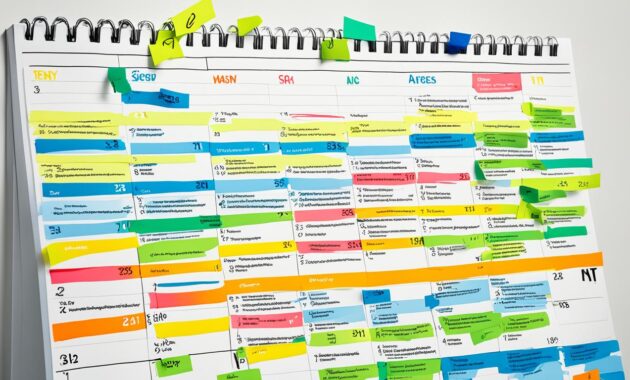- Exam schedules are crucial for student success, as they help reduce anxiety, improve time management skills, and enhance retention and comprehension. By creating a personalized exam schedule, students can identify their learning styles, prioritize subjects and topics, and allocate sufficient study time. Incorporating active learning techniques, such as note-taking, summarizing, and using flashcards and mind maps, can further improve exam preparation. Additionally, utilizing educational resources, such as online video lessons and practice exams, can contribute to better exam results.
Key Takeaways
- Exam schedules help reduce anxiety and improve time management skills.
- Creating a personalized exam schedule allows students to identify their learning styles and prioritize subjects.
- Active learning techniques, such as note-taking and summarizing, can enhance exam preparation.
- Utilizing educational resources, like online video lessons and practice exams, can contribute to better exam performance.
- Balancing study time and incorporating breaks can lead to improved retention and comprehension.
Understanding the Importance of an Effective Exam Schedule
Crafting an effective exam schedule is crucial for a student’s academic success. By planning and organizing their study time, students can reduce anxiety and stress associated with exams. Proper time management skills, such as prioritizing tasks and avoiding distractions, can lead to improved study efficiency and better retention of information.
Reducing Anxiety and Stress
Exam periods can be a significant source of exam anxiety and exam stress for students. By developing a structured exam schedule, students can alleviate these concerns and focus their efforts on effective preparation. This, in turn, can boost their confidence and performance on the day of the exam.
Improving Time Management Skills
Effective time management is crucial for successful exam preparation. By prioritizing tasks and managing their time efficiently, students can ensure they allocate sufficient study time for each subject, leading to better comprehension and retention of the material.
Enhancing Retention and Comprehension
In addition to time management, incorporating active learning techniques, such as summarizing and teaching others, can significantly enhance a student’s retention and comprehension of the subject matter. This, in turn, can translate to improved exam performance and better overall academic outcomes.
Creating a Personalized Exam Schedule

Developing a personalized exam schedule is crucial for students to maximize their study time and prepare effectively. By identifying their individual learning style, students can tailor their study methods to better suit their preferences, whether they are visual, auditory, or kinesthetic learners.
Identifying Your Learning Style
Understanding one’s preferred learning style can help students create a more effective study plan. Visual learners may benefit from creating mind maps, diagrams, and flashcards, while auditory learners may find success in listening to recorded lectures or discussing the material with peers. Kinesthetic learners, on the other hand, might thrive by incorporating physical activities, such as role-playing or hands-on demonstrations, into their study routine.
Prioritizing Subjects and Topics
When creating a personalized exam schedule, it is crucial to prioritize subjects and topics based on their complexity and importance. Students should allocate more study time for subjects or topics that they find particularly challenging or that are weighted more heavily in the exam. This approach ensures that students focus their efforts on the areas that require the most attention, leading to a more efficient and effective study process.
Allocating Sufficient Study Time
Effective study time management is key to academic success. When developing a personalized exam schedule, students should allocate sufficient time for each subject, while also incorporating regular breaks and downtime. This balanced approach can lead to improved retention and understanding of the material, as it allows students to maintain focus and avoid burnout during the preparation process.
Incorporating Active Learning Techniques

Mastering the art of exam preparation requires more than just passive studying. By incorporating active learning techniques, students can significantly enhance their understanding and retention of the material. One such technique is note-taking and summarizing, which encourages students to actively engage with the content, identify key concepts, and synthesize the information in their own words.
Note-Taking and Summarizing
Effective note-taking not only helps students stay focused during lectures and study sessions but also serves as a valuable reference point for review. When combined with the practice of summarizing the key takeaways, students can deepen their comprehension of the subject matter and better prepare for exams.
Teaching Others
Another powerful active learning technique is teaching others. By explaining the material to a classmate or a study group, students can solidify their own understanding and develop valuable communication skills. The process of teaching reinforces the student’s knowledge and encourages them to think critically about the subject matter.
Using Flashcards and Mind Maps
Employing visual aids, such as flashcards and mind maps, can also be highly effective in exam preparation. Flashcards help students memorize and recall key definitions, formulas, or concepts, while mind maps provide a holistic, visual representation of the relationships between different ideas. These techniques facilitate a deeper understanding of the material and improve overall retention.
By incorporating these active learning techniques into their study routines, students can elevate their exam preparation to new heights. Through engaged note-taking, teaching, and the use of visual aids, students can unlock a more comprehensive understanding of the subject matter, leading to improved performance and confidence on exam day.
Utilizing Educational Resources

Leveraging educational resources can be a game-changer in exam preparation. Online video lessons, provided by subject matter experts, can help students grasp complex concepts and fill in any knowledge gaps. Additionally, practicing with previous years’ exam papers and accessing comprehensive question banks can familiarize students with the exam format and identify their strengths and weaknesses, allowing them to focus their study efforts effectively.
Online Video Lessons
Numerous educational platforms offer a wealth of online video lessons covering a wide range of subjects. These lessons, often taught by experienced instructors, can provide students with a deeper understanding of the course material and address any areas of confusion. By supplementing their studies with these valuable resources, students can reinforce their knowledge and better prepare for the upcoming exams.
Practice Exams and Question Banks
Practicing with previous years’ exam papers and accessing comprehensive question banks can greatly improve a student’s exam performance. These resources allow students to familiarize themselves with the exam format, question styles, and time constraints, enabling them to develop effective strategies for managing their time and demonstrating their knowledge during the actual exam. Additionally, identifying areas of weakness through these practice exercises can help students focus their study efforts and improve their overall understanding of the subject matter.
Exam Schedule

Understanding the exam format is crucial for students to create an effective exam schedule. By familiarizing themselves with the structure and timing of the exams, students can allocate their study time accordingly and develop a balanced schedule that covers all subjects and topics.
Understanding Exam Formats
Exams can come in various formats, from multiple-choice questions to essay-based assessments. Students should research the specific exam formats they will be facing and tailor their preparation accordingly. This knowledge will help them plan their study time and focus on the necessary skills and strategies.
Creating a Balanced Schedule
Developing a balanced exam schedule is essential for managing exam preparation effectively. Students should allocate time for each subject based on its importance and the amount of material that needs to be covered. This approach ensures that no subject is neglected and that the overall study plan is comprehensive.
Factoring in Breaks and Downtime
Exam preparation can be intense and mentally exhausting, so it’s important for students to factor in regular breaks and downtime to prevent burnout. This might include taking short breaks between study sessions, engaging in physical activity, or practicing relaxation techniques. By maintaining a healthy work-life balance, students can stay focused and perform at their best during the exams.
Effective Time Management Strategies

Effective time management is essential for successful exam preparation. By prioritizing tasks based on their importance and difficulty, students can ensure that they are allocating their time efficiently. Avoiding distractions, such as social media and entertainment, can help maintain focus and productivity during study sessions. Incorporating regular breaks and self-care activities, like exercise and relaxation techniques, can help students recharge and maintain their mental and physical well-being throughout the exam preparation process.
Prioritizing Tasks
To make the most of their study time, students should prioritize tasks based on their level of importance and difficulty. By identifying the most critical subjects and topics that require the most attention, they can allocate their time and resources accordingly. This approach helps students avoid procrastination and ensures they cover the essential material before the exam.
Avoiding Distractions
In today’s digital age, it’s easy for students to get sidetracked by social media, online entertainment, and other distractions. To maintain focus and productivity, it’s crucial for students to minimize these interruptions during their study sessions. Strategies like turning off notifications, setting designated study times, and creating a distraction-free environment can significantly improve their time management and exam preparation.
Incorporating Breaks and Self-Care
While it’s essential to prioritize study time, students should also remember to take regular breaks and engage in self-care activities. Stepping away from their studies for short periods can help refresh their minds, reduce stress, and improve their overall well-being. Activities like exercise, meditation, or simply taking a walk can provide the necessary mental and physical rejuvenation to maintain focus and energy throughout the exam preparation process.
Stress Management and Self-Care

Exam preparation can be a stressful experience, and it is crucial for students to prioritize their mental and physical well-being. By incorporating effective stress management and self-care strategies, students can maintain their focus and perform at their best during the exam period.
Exercise and Physical Activity
Engaging in regular exercise and physical activity can have a profound impact on stress reduction and cognitive function last day of classes. Activities such as yoga, jogging, or even a simple daily walk can help students release built-up tension, improve mood, and enhance mental clarity. By incorporating these activities into their routine, students can better manage the demands of exam preparation and maintain a healthy balance.
Mindfulness and Relaxation Techniques
Practicing scheduled for the same day mindfulness and relaxation techniques can also be highly beneficial for students during the exam preparation process. Techniques like meditation, deep breathing exercises, and progressive muscle relaxation can help students manage anxiety, improve focus, and promote a sense of inner calm. By taking regular breaks to engage in these practices, students can recharge and approach their studies with renewed energy and concentration.
Seeking Support and Counseling
While exam preparation can be a solitary endeavor, it is important for students to seek support and guidance from their peers, teachers, or even professional counselors . Connecting with others who are experiencing similar challenges can provide a sense of community and help students develop coping strategies . Additionally, seeking the expertise of a counselor can offer valuable insights and personalized strategies for managing stress and maintaining overall well-being during the date and time exam period. stress management and self-care
practices, students can better navigate the demands of exam preparation and maintain their physical and mental health throughout the process. Incorporating a balanced approach that includes exercise , mindfulness , and support can help students achieve their academic goals while preserving their overall well-being.
Practice and Revision

Consistent practice and revision are essential for mastering the material and performing well on exams. By reviewing previous exam papers, students can familiarize 2024 exam schedule themselves with the question formats and identify areas that require more attention.
Reviewing Previous Years’ Exam Papers
Examining previous exam papers allows students to gain valuable insights into the types of questions they may encounter and the level of difficulty they can expect. This practice helps them become more comfortable with the exam format and develop effective strategies for approaching different question types.
Simulating Exam Conditions
In addition to reviewing previous exam papers, students should also take the time to simulate exam conditions by practicing under timed conditions. This approach helps them develop the necessary skills and mental stamina to perform at their best during the actual exam. By experiencing the pressure and time constraints of the exam environment office of the registrar, students can build confidence and refine their time management techniques.
Final Preparations and Exam Day Tips

As the exam day approaches, it is essential for students to focus on their final preparations and maintain a positive mindset. Getting enough rest the night before the exam can help students feel refreshed and alert, ensuring they are well-rested and ready to tackle the challenges ahead.
When it comes to nutrition, consuming a nutritious meal on exam day can provide the necessary energy and cognitive support for optimal performance. Fueling the body with the right nutrients can enhance mental clarity and concentration, giving students the edge they need to excel in their exams.
Arriving at the exam venue early can also play a crucial role in reducing stress and allowing students to settle in and focus on the task at hand. By being punctual, students can avoid the last-minute rush and enter the exam room with a calm and collected mindset, ready to put their best foot forward.
Finally, maintaining a positive and confident attitude throughout the exam can contribute to better results. Staying focused, managing any anxiety or stress, and believing in one’s abilities can help students perform at their highest level and achieve the desired outcomes.
Also Read: Maximizing Academic Success: A Guide To The Best Study Exam Planner Apps
Conclusion
In conclusion, optimizing an exam schedule is a crucial step towards academic success. By understanding the importance of an effective exam schedule, creating a personalized plan, incorporating active learning techniques, and utilizing educational resources, students can significantly improve their exam performance. Additionally, practicing effective time management strategies, managing stress, and preparing thoroughly for the final exam can help students achieve their desired results.
By following the tips and strategies outlined in this article, students can confidently approach their exams and maximize their chances of exam success. From developing a personalized exam schedule to incorporating study techniques and managing stress, this comprehensive guide provides the tools and resources necessary for students to excel in their academic pursuits.
Ultimately, the key to achieving success in exams lies in a well-rounded approach that combines strategic planning, diligent preparation, and a commitment to self-care. By embracing these principles, students can not only improve their exam performance but also cultivate the skills and habits that will serve them well throughout their academic and professional journeys.
FAQs
Q: When will the final exam for spring 2024 be held?
A: The final exam for spring 2024 will be held according to the final exam schedule released by the registrar’s office.
Q: How can I reschedule my exam in 2024?
A: If you need to reschedule your exam in 2024, you should reach out to the registrar’s office for assistance.
Q: What is the process to change the exam time for a class meeting?
A: Any changes to the exam time for a class meeting must be approved by the faculty member in charge and the registrar’s office unless otherwise specified in the syllabus.
Q: When is the fall 2024 final exam schedule typically released?
A: The fall 2024 final exam schedule is usually released by the university registrar closer to the exam week for that semester.
Q: Can I reschedule only one exam if I have multiple exams during the same time slot?
A: If you have multiple exams scheduled at the same time, you may be able to reschedule one exam with approval from the registrar’s office and the respective faculty members.
Q: Are final exams typically held on specific days like Wednesday in 2024?
A: Final exams are scheduled as per the final examination schedule provided by the university registrar, and they may not always fall on the same day each year.
Q: How do I find information about exam times for my classes that meet on specific days?
A: Information regarding exam times for classes that meet on specific days can be found in the class schedule or syllabus provided by the faculty members.
Source Links